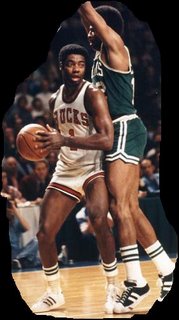Terry Stotts is having a fastbreak fantasy

In an article by Milwaukee Journal-Sentinel's Tom Endlund, Coach Terry Stotts promised the '06-'07 Bucks would push the ball up the floor faster, and would employ a traditional fastbreaking style (outlet to a guard, fill the lanes, and run under most any circumstances). Every team should seek to cutdown on wasted backcourt time, of course that's a good idea. But employing a traditional three lane fastbreaking style, as Stotts clearly implied, would be a disaster.
A true fastbreak style would kill the Bucks
Let's say the Bucks chose to employ a true fastbreak style, meaning they would look to run in all situations, even after made baskets, as many teams did in the 70s and 80s. It wont work today. Against today's "opportunity break" teams -- and that's every other team in the NBA -- the fastbreaking Bucks would look like a slightly saner version of the disastrous Paul Westhead Denver Nuggets. And they would be about as successful.
Why does Stotts say he wants to employ this style, then?
For the same reason your high school coach spent hours in practice making the team do "11 man break" drills, but when it came game time he would greet any attempt to truly push the pace with a stern "HEY! Slow it dowwwn! Get a good shot!"
What I'm saying is, coaches love to talk about fastbreaking in theory because they envision waves and waves of lay-ups. Think Phi Slamma Jamma vs. the Doctors of Dunk. But, unless the opposition's guards are led foots, or the other team will run as relentlessly as you do (as the Doctors of Dunk did in that famous semifinal game) that never happens under real game conditions. The fact of the matter is all out fastbreaking teams are terribly inefficient offensively -- prone to turnovers, ill-advised shots, etc. Thus they need more possessions every game to be successful.
PACE way down, Pts Per Poss way up
Its no coincidence that as the the average number of possessions per game (or PACE) has declined over the last 30 years, the average points per possession (or PPP) has shot way up. Let me illustrate with an example. During the 1976-77, the median PACE was 109.96 (by comparison, NO team has had a PACE over 100 this century). Last season the median pace was 93.5 (about what the Bucks were at). The median PPP in '76 was 96.9, and the median number of turnovers by each team was 1680. The median PPP last year was 103.5, and the median number of turnovers by each team was 1186.
Will you run with me?
Teams cannot afford the offensive inefficiencies an all-out fastbreaking style would surely bring unless they knew for certain that their opponent would also employ a fastbreaking style and suffer the same inefficiencies. Why? Because an opponent can quite easily prevent a true breaking team from getting the optimal number of possessions they need to overcome the offensive production of a more efficient team. Think Muhammad Ali and George Foreman. Ali knocked guys out by smothering them with flurries -- like a fastbreaker. George Foreman could put you out with one punch -- he was efficient. Imagine if Foreman could independently prohibit Ali from being able to throw the number of punches he needs to win? That's what an efficient team can do to a fastbreaker. Any team can slow a game down by simply deciding to be deliberate. But it takes two to speed the game up.
So, while I wholeheartedly agree the Bucks ought to try and get into their offense before the defense sets up, Stotts was just smoking up a pipe dream when he said they would be a 70s style fastbreak squad. Never happen.
Footnote: An "opportunity break" team looks to run off steals, long rebounds, or any time they see a numerical advantage in front of them. A "traditional fastbreaking" team, like the Magic Johnson Lakers of the 80s will run regardless of the numbers in front of them. They will try to "beat" the other team down the floor. This requires fast forwards like Cooper and Worthy and a preternatural point guard such as Johnson -- one who can maintain his dribble and can also thread the needle with his passing.


0 Comments:
Post a Comment
<< Home